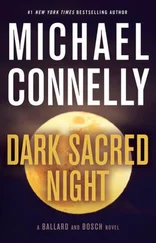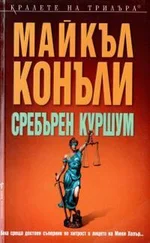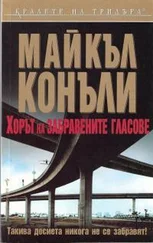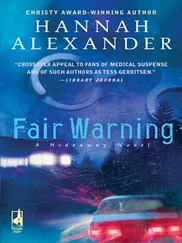There it was. I was four for four. Four AOD deaths, four victims who had turned their DNA over to GT23. There had to be a connection.
I asked Kinsey Russell a few follow-up questions but didn’t register their answers. I was moving on. I had momentum. I wanted to get off the phone and get to work. Finally, I thanked her for her help, said I would stay in touch, and ended the call.
I looked up after putting the phone down and saw Myron Levin looking over the half-wall of my cubicle. He was holding a mug of coffee with the FairWarning logo on it. The A in Warning was a red triangle with a lightning bolt through it. I was feeling the power of that bolt right now.
“Did you hear all of that?”
“Some of it. You have something?”
“Yeah, I got something big. I think.”
“Let’s go to the conference room.”
He pointed his cup toward the room.
“Not yet,” I said. “I need to make a few more calls, maybe go see somebody, then I’ll be ready to talk. You’re going to like it.”
“Okay,” Myron said. “Ready when you are.”
I pulled up everything I could on GT23 and immersed myself in the business of DNA analytics.
The piece that was most informative was a 2019 profile of the company published in Stanford Magazine as GT23 turned two years old and had just gone public, making its five founders extremely wealthy. It was an offshoot of an older company called GenoType23, which was founded two decades earlier by a group of Stanford University chemistry professors who pooled money to open a secure lab catering to law-enforcement agencies too small to fund their own labs to conduct forensic DNA analysis in criminal cases. The first company was initially successful and grew to have more than fifty court-certified technicians working and testifying in criminal cases across the western United States. But DNA became the panacea. It was increasingly being used around the world to solve crimes old and new, as well as to clear those wrongfully accused and convicted. As more and more police departments and law-enforcement agencies caught up technologically and opened their own forensic DNA labs or funded joint and regional labs, GenoType23 faced declining business and revenues and had to lay off staff.
As the company declined, a new area of social analytics emerged in the DNA field following the completion of the human-genome project. Millions of people began seeking their ancestral and health histories. The founders retooled and opened GT23, a budget DNA analytics firm. There was a catch to the low cost, however. While the large forerunners in the field asked customers to volunteer their DNA anonymously for research, GT23 didn’t offer a choice. The low cost of analysis needed to be offset by making the collected samples and data available — still anonymously — to research facilities and biotech firms willing to pay for it.
The move was not without controversy, but the whole field was awash in privacy-and-security concerns. GT23’s founders weathered the questions with the basic explanation that submitting DNA to them was in fact volunteering it for research, and they proceeded to market. And the market responded. So much so that little more than a year later the founders decided to take their company public. The five founders rang the bell on the New York Stock Exchange as trading in their company opened — ironically or perhaps coincidentally — at twenty-three dollars a share. The founders became rich overnight.
I next came across a more recent article in Scientific American that carried the headline “Who Is Buying GT23’s DNA?” The article was a sidebar to a larger story that explored the ethical and privacy concerns in the freewheeling world of DNA analysis. The writer of the article had found a source inside GT23 and obtained a list of universities and biotech research facilities that bought DNA data from the company. These ranged from labs at Cambridge University in England to a biologist at MIT to a small private research lab in Irvine, California. The article said that DNA from GT23 participants — the company did not use the word customers — was being used in studies involving the genetics behind a variety of diseases and ailments, including alcoholism, obesity, insomnia, Parkinson’s, asthma, and many others.
The variety of studies that the data from GT23 contributed to and the good that might come from it — not to mention the potential profits to universities, Big Pharma, and companies producing wellness products — were staggering. The article identified a study at UCLA that dealt with appetite satiation and the genetic roots of obesity. A cosmetic company was using GT23 participants to study aging and skin wrinkling. A pharmaceutical company was researching why some people produce more earwax than others, while the lab in Irvine was studying the connection between genes and risky behaviors such as smoking, use of drugs, sex addiction, and even speeding while driving. All these studies aimed at understanding the causes of human maladies and developing drug and behavioral therapies that would treat or cure them.
It all seemed good and it was all profitable — at least to the founders of GT23.
But the main article that ran with the sidebar threw a shadow over all the good news. It reported that regulatory enforcement of the billion-dollar genetic-analytics industry fell to the U.S. Food and Drug Administration, which until recently had taken a complete pass on those responsibilities. The article quoted a recent report from the National Human Genome Research Institute:
Until recent years, FDA chose to apply “enforcement discretion” to the vast majority of genetic tests. FDA can use such discretion when it has the authority to regulate tests but chooses not to.
The article went on to report that the FDA was only now in the process of formulating rules and regulations that would eventually be presented to Congress for adoption. Only then would any kind of enforcement begin.
Due to the rapid growth of direct-to-consumer genomic testing, and FDA’s mounting concern that unregulated tests pose a public health threat, FDA is modifying its approach. To this end, FDA has drafted new guidance to describe how it intends to regulate genetic testing. FDA “guidance” is different from laws and regulation in that it represents only FDA’s “current thinking” on a topic and is not legally binding for FDA or the parties it regulates.
I was stunned. The report concluded that there was virtually no government oversight and regulation in the burgeoning field of genetic analytics. The government was far behind the curve.
I printed a copy of the story for Myron to read and then went to GT23’s website to look for any acknowledgment that the services the company provided and the security it promised were not backed by government regulation. I found none. But I did stumble across a page that outlined how researchers could go about requesting anonymized data and biological samples and the fields of study the company supported:
Cancer
Nutrition
Social Behaviors
Risky Behaviors
Addiction
Insomnia
Autism
Mental Disorders (bipolar disorder, schizophrenia, schizo-affective disorder)
On the website the recipients of data and bio samples were called collaborators. It was all presented in a cheery, change-the-world-for-the-better pitch that I was sure was crafted to allay any potential participant’s concerns about anonymously putting their DNA into the great unknown of genetic analysis and storage.
Another section of the website contained a four-page privacy- and-informed-consent statement that outlined the anonymity guaranteed with the submission of one’s DNA in a GT23 home-sampling kit. This was the boring fine print but I read every word of it. The company promised participants multiple layers of security in the handling of their DNA and required all collaborators to meet the same levels of physical and technical protection of data. No biological sample would be transferred to a collaborator with any participant’s identity attached.
Читать дальше
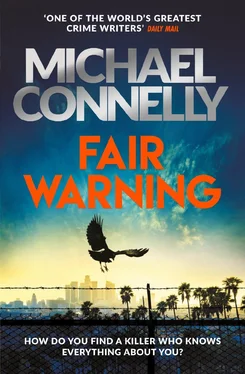



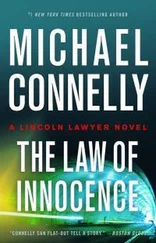
![Майкл Коннелли - Christmas Even [Short story]](/books/390532/majkl-konnelli-christmas-even-short-story-thumb.webp)
![Майкл Коннелли - The Night Fire [Harry Bosch - 22]](/books/405630/majkl-konnelli-the-night-fire-harry-bosch-22-thumb.webp)
